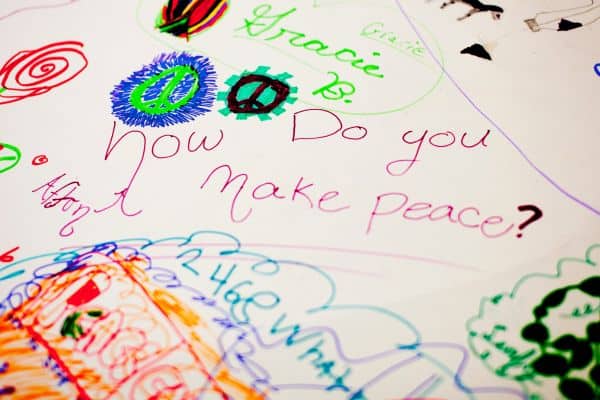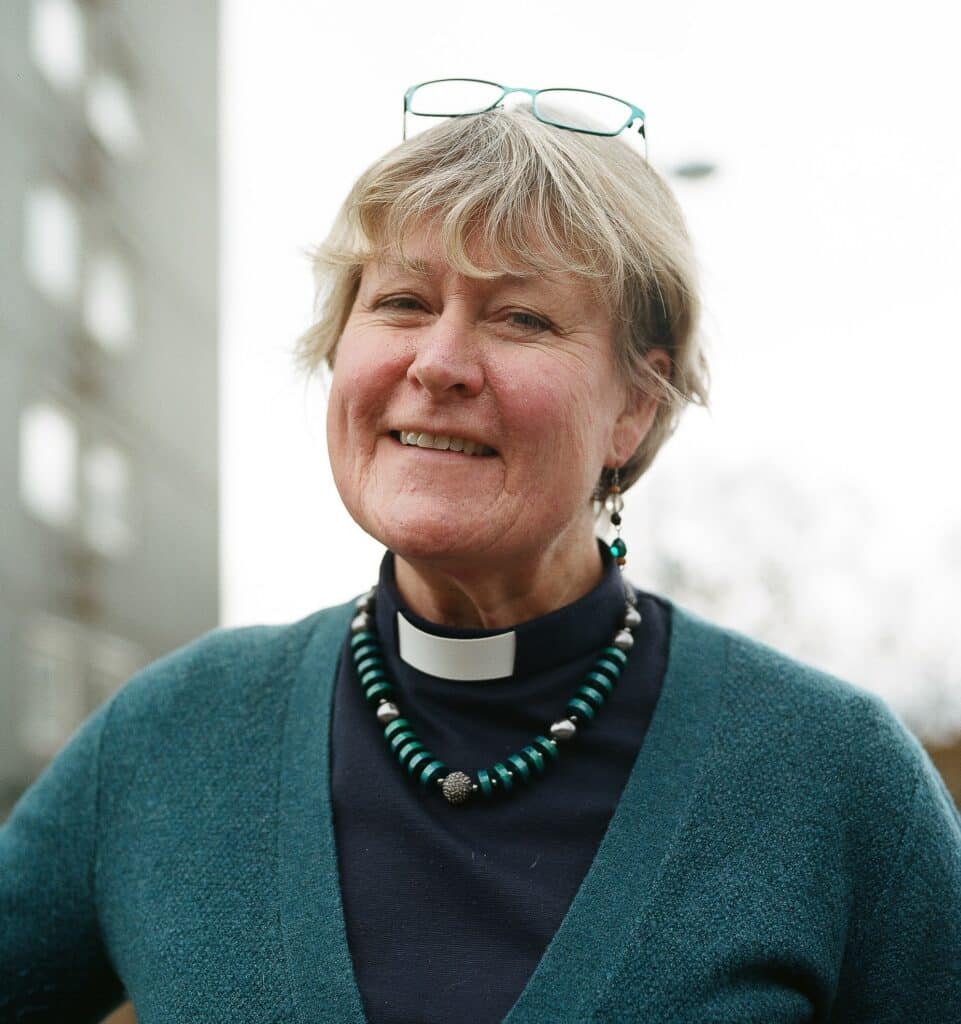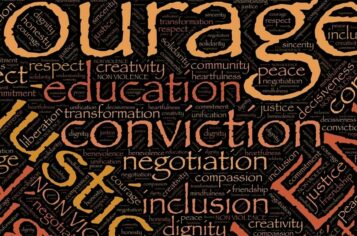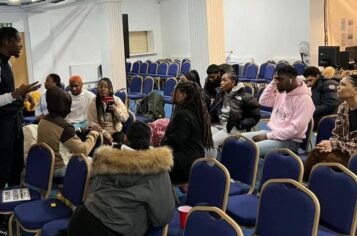This website uses cookies so that we can provide you with the best user experience possible. Cookie information is stored in your browser and performs functions such as recognising you when you return to our website and helping our team to understand which sections of the website you find most interesting and useful.

Pioneer Missioner, Catherine Matlock shares what inspires her as a peacemaker, why peacemaking matters for mission and what excites her about running Difference.
I’m an ordained Pioneer Missioner in Lichfield Diocese. The official Church of England definition of pioneers is people called by God, who are the first to see and creatively respond to the Holy Spirit’s initiatives with those outside the church; gathering others around them as they seek to establish new contextual Christian community.
Peacemaking and reconciliation are a passion for me. I think Archbishop Justin Welby was right when he said that something in our very early lives probably draws us to this kind of work. In my childhood, I longed for peace within my family, and I think that’s the grain that then developed into that desire for peacemaking on a wider scale. Clearly, as a child, I couldn’t enable that, but that same desire for good relationships, working through our differences for peace inspired me from a very early age.
Reconciliation is at the root of our faith
As Christians, we have a ministry of reconciliation that is at the root of our faith and a mandate for reconciliation in our close and wider relationships. The fact that Archbishop Justin has reconciliation as one of his priorities has enabled some wonderful peacebuilding initiatives to be developed through the Church of England at this time, especially the Difference course.
If we as Christians are not building peace with each other, and not aiming to build peace within divided communities, I don’t see how we are inspiring others with our faith or how we’re advocating for loving relationships. At the heart of our Christian discipleship journey is reconciliation with God, reconciliation with others and reconciliation with self. I often think that as Christians, we’re keen to sell Christianity through preaching and sharing the good news. But unless we are practising peace within our own church communities or finding ways to bring peace to an increasingly divided world, our Christian faith isn’t attractive to others.
We engage in conflict in different ways daily
Over the last 10 years, I’ve visited several countries that have experienced conflict, for example, Israel, Palestine, Rwanda, Cambodia and Northern Ireland. I found my experiences there incredibly sobering. Here in the UK, I see some of the same issues that bubble up in society, bubble in us as human beings as we engage in conflict in different ways daily. I think we look at conflict, violence and war in different parts of the world and it can feel far away from our lived reality. But we tend to project it out there and not necessarily see how anger, shame, greed, fear and various other issues are affecting us in our own society day-to-day. We’re all fragile and messy human beings and unless we find ways of working for peace and reconciliation, our own lives, society and churches are in trouble.
The simplicity of Difference
I got introduced to Difference in 2018 and was involved in the first pilot where we trialled the course material and gave feedback on the resources. Difference offers a way of enabling people to begin to look at their attitudes and judgements, their preconceptions, and projections – what gets in the way of their relationship with others, particularly those whom they judge to be different from themselves.
I love the simplicity of Difference. There are three simple habits; ‘Be curious’, ‘Be present’ and ‘Reimagine’ and the repeated structure and rhythm of the sessions (story, space and sanctuary) – works really well. What I also love about Difference is that it doesn’t try to advocate that forgiveness and navigating disagreement come just like that. There’s an honesty and authenticity from the resource that says, ‘actually, it’s really hard and it’s really messy’.
I’m naturally curious. I’ve always been someone more inclined to listen than to talk, particularly if I don’t know people. I’m also curious to know about myself. I’ve got a degree in psychology, training in counselling and a deep desire to understand self, understand others, and understand what’s going on in relationships.
I see in my close relationships how I struggle more with navigating disagreement or forgiveness, because I think there’s more complex baggage there. It’s almost easier to relate well when someone is very different from yourself, for example, if I’m talking to someone from another faith. I might find that easier than talking to a Christian with a different theological perspective from me.
I am more conscious now of acknowledging and embracing that difference as much as possible. I think I’m better at observing myself in those situations, by taking a metaphorical step back. It is that ability to stand back and observe – and in the moment, to think about, ‘how I can do that differently?’ I’m also someone who tries to build internal peace through practising contemplative prayer, which I believe supports and sustains peaceful external relationships.
Deep work going on within us
Difference has excellent resources that are easily downloadable and can be applied to different contexts. You don’t have to spend a lot of time thinking about new material. You might want to contextualise it in places, but it’s there and that’s hugely helpful. For people thinking about running the course, I would say give yourself time, and take the material seriously. It has the potential to open up deep conversations and reflection. Don’t try to rush through it!
There needs to be pastoral support made available if people require it. During the Difference sessions people open up about some big issues and share some potentially painful responses and emotions, so you need to create and hold a safe space. This is not just another course. There’s some deep work going on here within us as human beings and with the Holy Spirit. So, we need to be aware of that and engage with it in a reflective and committed way.
Hope for change in the world
I believe that peacemaking is a missional imperative for the church, and I’m totally committed to this work. My hope is to do whatever I can in the next few years to encourage and enable my Diocese to establish peacebuilding and reconciliation initiatives across a range of contexts, especially in our schools.
In Stoke on Trent, we’ve been piloting the new materials for the secondary school adaptation of Difference, due to launch next spring. In the Navigating Disagreement session, a young Christian student we’re working with suggested a different Bible story that he thought would have been more helpful. The course was a springboard for that young man to think, ‘what is the material saying to me and how can I connect with what I already know in my Christian faith?’ He did not just take the course as it stood. He was thinking deeper into the material already around how we respond to others in relationships and what gets in the way. That was quite amazing.
I’m hugely encouraged by piloting the course in schools because the pupils come out with such incredible wisdom and remember the three Difference habits easily – they seem to be ‘sticking’. If we can enable our young people to respond differently, to relate differently and become ambassadors of peace, then we have hope for change in our world – I’m totally behind our Archbishop’s ambition for that now!

Reverend Catherine Matlock is a Pioneer Minister, facilitating pioneering programmes in Stoke deanery of Lichfield Diocese.




